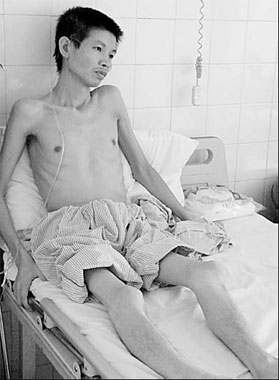About 120 migrant workers suffering from black lung staged a sit-down strike yesterday outside?Shenzhen municipal government to plea for reasonable compensation.
 |
|
Xu Shuzhong, 35, one of the black lung disease sufferers , receives treatment at Shenzhen Hospital for the Prevention and Treatment of Occupational Diseases on Tuesday. The 1.64-m-tall man weighs only 35kg. |
The workers, all from Daozi county of Leiyang, Central China's Hunan province, once worked underground to lay the foundations for Shenzhen's economic development.
Their jobs were tough and admirable. Now they are sick from the dust they breathed.
Xu Ruibao and his elder brother Xu Ruinai went to Shenzhen, China's first special economic zone, in late 1980s when the city was growing rapidly and the of skyscrapers were being constructed everywhere.
They could earn 2,000 to 3,000 yuan a month at a time when the monthly income in China was 400 to 500 yuan.
"Every man in my village wanted to work in Shenzhen like me. If we knew the job could lead to incurable diseases, we would have never exchanged our lives for money," Xu Ruibao said.
He is at the second stage of the illness, while his brother is at the late stage and cannot walk farther than three steps.
They were diagnosed with black lung during recent check-ups at the Shenzhen Hospital for the Prevention and Treatment of Occupational Diseases.
"The local government agreed to give compensation of 30,000 yuan ($4,385) each to those who could not prove their employment relationship," said worker representative Xu Zhihui.
Unfortunately, many workers did not have proper contracts, and proving their employment has been difficult.
"We are very disappointed because that small amount of money won't help much," Xu told China Daily.
They had asked for compensation of 200,000 yuan for those at the first stage of the disease, with 50,000 for each stage after that.
"Some of the workers are so sick that they won't live for many years without proper medical treatment. Their families have spent every penny to cure the disease," said Xu, who also suffers from black lung.
"We will continue the peaceful sit-down strike until the government reconsiders our requests," Xu Ruibao said.
Underground they wore masks, but they would change them only once a month or even longer.
"Nobody reminded us that the dust was dangerous to our health," Xu said.
Since 1999, more and more workers from Shenzhen have shown symptoms of chest tightness, cough and lingering fevers, and gradually they have been unable to work.
"A total of 17 people died and more people were diagnosed with black lung," said Xu Zhihui.
However, only when Xu Ruibao got 100,000 yuan from his boss in April did they think about compensation.
More than 170 workers have visited Shenzhen since May, but they failed to prove their employment.
The local government set up a team for them, including officials from the legal affairs office, labor department and health department, and started looking into the case in June.
Xu Ruibao also expressed hopes that charity groups could offer jobs to the widows and children of his county.
"Most of us will not live long without medical treatments. Our families depended on us before, but who can they depend on after we die?" he said.
(China Daily July 31, 2009)